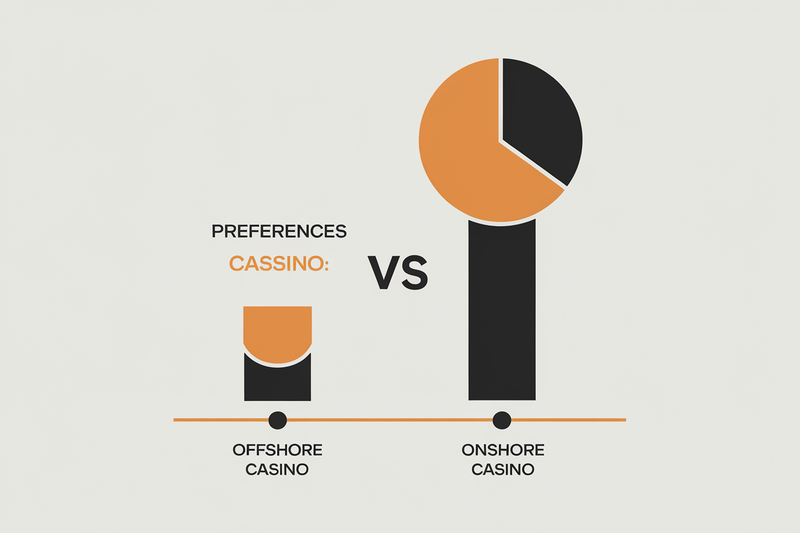Did you know that many players today turn more and more towards offshore online casinos and bookmakers, rather than in onshore online casinos? What is even more interesting — the players doing this often are not aware about it!

What Are Onshore And Offshore Casinos And Bookmakers?
Let’s be clear first regarding the definition of onshore vs offshore. Offshore casino or bookie is based in a country other than that of the player's residence. While an onshore casino is based in the same country as the player. Same with bookmakers.
Both types adhere to the gambling laws and regulations of the country they got their licence from. But in reality offshore places operate in multiple countries, accepting players from there.
Why Players Choose Offshore Gambling Over Onshore?

-
”Offshore” Doesn’t Mean “Illegal”
While the difference between licensed and non-licensed casinos is evident, it’s not so much regarding onshore and offshore casinos and bookies. Both establishment types are licensed. It's just that offshore casinos are based in countries with lax gambling regulations. And operate in multiple countries without bothering to obtain licences from there.
Thus depending on the local legislation, such casinos can be perfectly legal (offshore licence considered as legit as a local one), be in a “grey zone” (not explicitly forbidden) and only in a number of countries all casinos and bookmakers not holding a local valid licence are considered fully illegal.
-
Offshore Gambling Offers More
Onshore establishments, especially in countries like Great Britain operate under pretty stringent regulations. This affects game choices, max bet amount, accepted payment systems, payout size, the ways casino or bookie can promote itself, the amount of taxes to pay and so on.
The truth is that nowadays, if both casinos have a licence, for many players a casino with thousands of games (including rare ones), accepting crypto or credit cards and offering lucrative bonuses and promotions is preferable over casino with less games, limited number of payment systems, less bonuses, but that features Gamstop self-exclusion scheme and is fully UKGC-compliant. Because players value choice and convenience. Players, who had excluded themselves from the UK onshore gambling through Gamstop, simply lack any other options than offshore places.
-
Offshore Gambling Has Better Promotion Opportunities
Onshore institutions are often limited in how, where and to whom they may promote themselves. Local laws may restrict certain marketing options, force to promote responsible marketing strategies, forbid to use channels that can, for example, unintentionally advertise gambling and betting for minors.
Compare this, for example, with an offshore casino operating under Curacao licence. That explicitly forbids only players from a few countries, including Curacao (and even those in reality can join via VPN). This means the casino can essentially promote itself worldwide in a variety of ways, and in the UK in particular, not being bound by the UKGC rules.
Offshore establishments offten allocate huge budgets for promotion, and this pays off as they receive players from many countries. Celebrities, like Drake, promoting the notorious Stake.com and other similar projects through playing the games there are just more attractive and offer more reach than anything else compliant with the UK Advertising Codes.
If the laws allow, offshore casinos and bookmakers even go as far as competing with onshore establishments for local billboard advertising spaces, TV commercial slots and commercials options on streaming services. Often defeating onshore casinos on their home turf due to better ad quality.
-
Onshore Casinos Lack Quality
Limitations hamper competitiveness. Thus onshore casinos are often not pushing themselves to improve to the max even within the boundaries allowed by the local gambling laws. They feel they will always have their players, since many wouldn’t want or wouldn’t dare to venture outside for offshore gaming.
Ok, you can’t advertise in a certain way and the law forbids you from accepting credit cards? Disadvantage here. But what prevents you from redesigning your website from something stuck in the 2000’s into something more modern? Making the KYC process smoother? Not to ask for SOW over and over again? The gambling forums are full of complaints from the UK players who feel being treated like crap by local casinos. And the offshore establishments are here, ready to cater their needs.
-
People Don’t Care
As simple as that. There are people who have heard about some casino or bookmaker through an ad, from a celebrity, a friend or saw on a billboard. And this was enough for them to choose it over an onshore place and give it a try.
Sometimes It Is Either Offshore Gaming… Or Nothing!
Written above implies that a person has a choice whether to play onshore or offshore casinos. But legislation of some countries goes a long way to prevent those willing to play from actually playing. So there are cases when you are pushed to choose offshore or not play at all.
-
You Reside In France
France remains the largest country in Europe by population and economy that still refuses to legalise online casinos as of November 2024.
The French gambling sector is governed by the Internal Security Code and overseen by the National Gambling Authority (Autorité Nationale des Jeux, ANJ). And the ANJ continues to actively block Internet access to offshore online casinos that accept players from France. With 532 casinos being blocked in 2023 according to Playtoday.
All this led to France having a large gambling black market valued at up to €1.5 billion annually in gross gaming revenue (GGR) in comparison to €5.29 billion in GGR of the French legal market according to EGBA. With around 3.000.000 French players (out of 65.600.000 total population) monthly accessing offshore online casinos, as well as unlicensed places.
However, there is hope for the players. Since France is currently on the verge of a financial crisis, according to Yogonet there are plans to pass the legislation that legalises online casinos in 2025 in order to collect additional taxes. The situation may resolve in December 2024 or January 2025.
-
You Reside In Germany
But gambling in Germany is legal, one might say. True, but with a “humongous” €1,000 monthly deposit limit and €1 stake limit on slots, playing in German online casinos falls into the same category as racing on dead horses or boxing with hands tied behind the back.
Add the lack of progressive jackpots and live casino games, as well as no live betting, since all those are not permitted. And you get a strong impression that the lawmakers who were working on the Interstate Treaty on Gambling 2021 (GlüStV 2021) that establishes a regulatory framework for gambling in Germany, were doing it under the motto “No Fun Allowed”!
No wonder, according to the DSWV Study in 2023, up to 50% of all gambling activities by German players happens on offshore websites in comparison to only 30% in 2019. With all the disadvantages that the German onshore online casinos have, even generally law-abiding Germans prefer venturing into the grey and black zones of online gambling. Despite the German authorities blocking hundreds of offshore online casinos every year.
-
You Reside In Poland
Online sports betting is allowed in Poland for companies holding a local licence from the Ministry of Finance. And there are more than 10 betting operators offering their services for a Polish player, so there is competition and less inclination to look for offshore bookies.
However, if a resident of Poland wishes to play in an online casino, he has exactly one option — Total Casino launched in 2019 and run as a monopoly by a state-owned entity — Totalizator Sportowy. Don’t like what they offer? Cope. Or look elsewhere.
According to H2 Gambling Capital Report of 2021, a lot of people prefer to “look elsewhere”, with 2,6% of the adult population in Poland participating in online casino and poker games on offshore gambling websites. And 1,5% playing with an unlicensed betting operator at least once a month. Which in total gives us 1.160.000 adult Poles (out of the total country population of 38.000.000 in 2021) participating in offshore gambling.
The situation gets more complicated by the fact that unlike France and Germany, whose authorities just mainly block offshore casino websites, and leave the players alone, Poland’s legislation allows it to target players as well. Fines in the equivalent of up to €980.000 may be imposed, however, the exact amount depending on the income of the violator.
In addition, the unlicensed online casinos may face fines of up to €3.400.000. And the persons responsible for organising and running such casinos — face a prison sentence of up to 3 years.
To conclude the Polish offshore gambling question, Poland doesn’t forget to block offshore gambling websites as well. With 47617 domains already included since 2017 in the “Register of domain names used for the offering of gambling games contrary to the [Gambling] Act” by November 2024.
Why Do Italians Prefer Onshore Gambling No Matter What?
As a global conclusion, we have a peculiar case from our experience regarding the choice of offshore vs onshore. A few of our friends, who are in affiliate marketing, have told us that in Italy people prefer locally licensed casinos and bookmakers, despite quite a comprehensive regulation.
No matter whether they are looking for their first place to gamble, or they already had experience, they are ready to come a long way and do a comprehensive research to make sure that the place is compliant with the local gambling laws.
We have a few guesses within our team regarding why the country goes against the trend of offshore gambling and betting places becoming more popular.
They range from reasons of history and tradition. Italians are known for valuing the local over foreign in other spheres as well. After all, the first gambling house in the modern sense, the Ridotto, was opened in Venice (which is now part of Italy) in 1638. The word “casino” itself is Italian, as well as baccarat and bingo.
And the other guesses lie within the balanced relationship between the Agenzia delle dogane e dei monopoli — the regulator of the gambling sector, the players and the casinos. The regulator doesn’t push the local casinos with regulations too hard for them to become uncompetitive. The casinos strive their best to compete and deliver quality pastime. And the players display a healthy “gambling patriotism”, accepting some limitations as a result of more strict regulations, but enjoying safer yet still convenient gambling environment.
Compare this to the cases of France, Germany and Poland, that despite all the strict regulation and prohibition, can’t hold back the players from offshore online gambling in the age of accessible VPNs and crypto payments. Thus losing billions of Euros in possible tax revenues.


